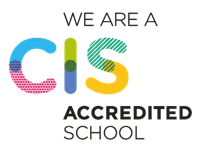At KIST, we believe that students have the right to pursue our school mission in a safe, secure, healthy and caring school environment. We acknowledge the duty of care that we share in safeguarding and promoting the welfare of children, and are committed to ensuring safeguarding practice that reflects statutory responsibilities, government guidance, and compliance with best practice and accrediting body requirements.
KIST has a comprehensive child protection and safeguarding policy that serves to protect students from abuse or neglect, and empowers teachers and other adults with a ‘safeguarding code’ that supports them in maintaining positive, healthy relationships with students. As stipulated in the policy, all KIST staff have a responsibility to defend and uphold the right of all students to be safe and free from harm. As such, any suspected abuse must be reported.
To assist staff in recognizing signs of abuse and neglect, the policy provides a list of indicators that could alert staff to the possibility of a legitimate concern, and outlines the steps staff should take in reporting suspected child abuse, as well as the action the school’s child protection team – comprising the head of school, area principals, school nurse and student care coordinators – will take in investigating such situations.
In conjunction with the safeguarding policy, all adults involved in interacting with students at the school are required to sign an Employee Code of Conduct that articulates professional and personal behaviors and conduct that are both acceptable and unacceptable as based on the following three principles of conduct:
- Treat students with respect.
- Contribute to protecting students from harm.
- Maintain professional relations with students.
Training and recruitment
Aligned with the recommendations of the International Task Force on Child Protection (ITFCP), we hold ourselves to a high standard of effective recruiting practices with specific attention to child protection.
Specific practices designed to ensure child protection and safeguarding include:
- The provision of advanced training in child protection for key members of staff;
- The provision of training sessions and refresher courses in child protection for both new and continuing staff;
- Questioning candidates on their understanding of safeguarding issues during employment interviews;
- Requiring at least two professional references for each candidate;
- Requiring the submission of criminal background checks from successful candidates;
- Requiring all new staff to complete and sign a disclosure statement covering employment history, professional conduct and health issues;
- Requiring all new staff to complete and sign the Employee Code of Conduct.






